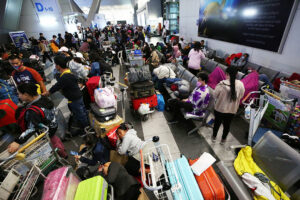THE GOVERNANCE Commission for Government-Owned or -Controlled Corporations (GCG) on Wednesday ordered the Civil Aviation Authority of the Philippines (CAAP) to submit a report on the air traffic management glitch that led to thousands of canceled flights on Jan. 1.
In a statement, the body that serves as the central advisory, oversight and monitoring body for state agencies said CAAP had three working days to submit the report.
“As partners in national development and public service, the report will inform the GCG, as the central oversight agency for GOCCs, on how it may further support CAAP to avoid the reoccurrence of such incidents,” GCG Chairman Alex L. Quiroz said.
“This report will help us ensure the functional operation and safe and reliable management of Philippine air navigation systems.”
Meanwhile, the Department of Transportation (DoTr) in a separate statement said the Department of Information and Communications Technology (DICT) had offered to help fast-track the purchase of equipment to replace those affected by the technical glitch.
The facility upgrade and replacement of affected equipment were decided at a Jan. 3 meeting of officials from DICT, Defense department, National Intelligence Coordination Agency and Intelligence Service of the Armed Forces of the Philippines, DoTr said.
The glitch did not appear to be caused by cyber-crime since the equipment could not be controlled outside the agency’s compound, CAAP said.
National Security Adviser Clarita A. Carlos said the communications and electrical equipment used by CAAP should be treated as “vital to national security” to facilitate their purchase.
CAAP this week said the technical glitch had been caused by a problem in the electrical network of its uninterruptible power supply.
Also on Wednesday, more lawmakers filed separate resolutions seeking to investigate the New Year’s Day system failure.
“A thorough investigation must be undertaken to identify both the proximate and contributory causes of the incident, determine liabilities of government officials and private contractors and ensure that measures are in place to prevent a similar — or worse — scenario in the future,” Senator Ana Theresia N. Hontiveros-Baraquel said in Senate Resolution 401.
While DoTr had ruled out sabotage, Ms. Hontiveros said that the technical issues put into question the ability of the Philippines’ air traffic control system to withstand cyber-attacks and hacking.
“What is mind-boggling is that despite the fact that government officials have known that the outdated air control system of the Philippines’ main gateway to the world was in danger of conking out any time and this issue was supposedly already raised at a Cabinet meeting, no concrete plans had been made for upgrade or improvement,” she said.
Senator Joseph Victor “JV” G. Ejercito in a separate statement said the incident posed a serious national security concern, where the territorial integrity of the country might have been jeopardized and the vulnerability of the country’s air navigation system was exposed.
He filed Senate Resolution 400 asking the Senate committee on public services to conduct a probe and come up with recommendations to strengthen the aviation industry.
“Air passengers’ safety and well-being were also put at risk due to the seemingly outdated system that is being used by the Air Traffic Management Center of the country’s main airport facility,” he said.
‘CORRUPTION’Ms. Hontiveros also cited the need to probe the private contractor of the communications, navigation and surveillance systems for air traffic management for a possible violation of its performance guarantee.
She also sought to investigate allegations of funding delays and possible corruption in the establishment of the system.
Ms. Hontiveros cited the long interval between the initial negotiation for the air traffic control system in February 2010 and its inauguration in 2018, and its impact on air control operations.
“Other allegations involve malversation, that is, the diversion of P13 billion supposedly earmarked for the backup of the air traffic control system to cosmetic projects during the administration of former President Rodrigo Duterte; negligence in the maintenance and upkeep of the equipment; and even possible human error,” she said.
Some migrant Filipinos workers who missed their flights might have lost their jobs, the senator said, adding that it could have affected the tourism industry.
San Jose del Monte Rep. Florida P. Robes filed a similar resolution seeking the probe. The lawmaker, who heads the good government committee, cited the lack of concern for air passengers and a “lack of coordination between CAAP and the Manila International Airport Authority (MIAA) with the airlines.”
Ms. Robes, who was one of the passengers affected by the glitch, said her committee would look into the maintenance of the country’s air traffic system and check if it has contingency plans.
The House of Representatives would also find out why the inauguration of the project took years after it was approved. “Was this really a force majeure or an act of man resulting from negligence and whose negligence?” she said in a statement.
Meanwhile, Party-list Rep. Bernadette Herrera-Dy has filed a bill that seeks to expand the refund of airline service fees in case of canceled flights under the Air Passenger Bill of Rights.
“Refunding has been a bother for airline booking despite reasonable causes of doing so,” she said in the bill’s explanatory note. “While this is a common issue for most passengers, airlines usually have no option for refunding these fees.”
Meanwhile, Senator Rafael “Raffy” T. Tulfo asked airlines to give a special rate for the airfare of overseas Filipino workers (OFWs) affected by the incident, noting that prices have since doubled after the crash.
“Many of them only come home once or less in a year,” he said in a statement. “The money that was supposed to be a gift or support for their family is instead going to the fare.”
Senator Mary Grace S. Poe-Llamanzares, who heads the public service committee, told reporters in a Viber message the congressional inquiry would start on Jan. 12. — Revin Mikhael D. Ochave, Alyssa Nicole O. Tan and Beatriz Marie D. Cruz
